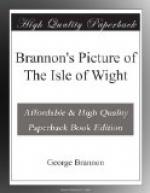“Creation’s mildest charms are here combined,”
enlivened by several splendid mansions, with their parks and groves. The churches are numerous: some “embosomed soft in trees,” and others picturesquely seated on commanding knolls: and many of the highest hills are adorned by a light-house or signal-station—some lofty obelisk, tower, or mill; so that in every direction a conspicuous object gives an interest and discriminative identity to those broad features of scenery, which would otherwise be perfectly tame and monotonous.
* * * * *
Situation, Extent, Climate, &c.
The Isle of Wight extends from east to west 23 miles, by about 14 from north to south (being very nearly the figure of a lozenge), circumscribes at least 60 miles, and contains upwards of 100,000 acres. It is separated from the Hampshire coast by a strait called the SOLENT SEA, varying from three to seven miles in width: and bounded by the British Channel on the south—the nearest part of the French coast being Cherbourg (18 leagues distant), which is said to have been seen from the hills of Freshwater, &c. The extent of the English coast visible in clear weather is above 100 miles, from Beachy Head in Sussex, to the Isle of Portland in Dorset.
THE CLIMATE.—The purity of the air was always acknowledged by those who ever visited the island owing to the dry and highly cultivated face of the country: but it was left to an eminent Physician, Dr. James Clarke, to give due celebrity to the unrivaled salubrity of the climate:—
“The Island, from the variety which it presents in point of elevation, soil, and aspect, and from the configuration of its hills and shores, possesses several peculiarities of climate and situation, which render it a very favorable and commodious residence throughout the year, for a large class of invalids. On this account, the Isle of Wight claims our particular attention, as it comprehends within itself advantages which are of great value to the delicate invalid, and to obtain which, in almost any other part of England, he would require to make a considerable journey.” And he further remarks, that “the Undercliff bids fair to exceed all other winter residences in this country, and the island will have added to its title of the Garden of England, that of the BRITISH MADEIRA.”
The classical designation of the island is VECTA or VECTIS: but its modern name is derived from Wect, With, or Wict, as it is found variously written in Doomsday Book.




